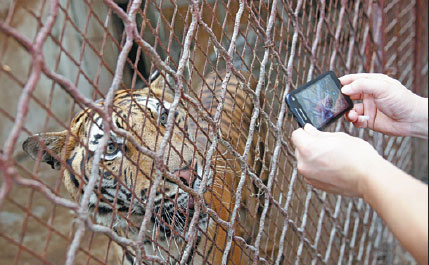Hard times for the lords of the rings
 0 Comment(s)
0 Comment(s) Print
Print E-mail China Daily, October 21, 2014
E-mail China Daily, October 21, 2014
 |
|
Tigers are sensitive to flash photography, which is regularly used by audiences at circus performances. [Photo/China Daily] |
"Running circuses is how the local people have made their livings for generations," Li Chengjian said.
About 15,000 people in more than 400 circus groups from the district provide performances across the country, according to Zhang Yongheng, deputy head of the Yongqiao Cultural Center and director of Yongqiao Intangible Cultural Heritage Office. Zhang estimates that nearly 2,000 Siberian tigers have been raised in circuses in the district.
The ban has made life tough for everyone engaged in the local circus industry, and many have had to adapt to survive.
Li Chengjian's circus has nearly 40 Siberian tigers, more than 30 African lions, about 30 bears, and a large number of other animals, making it the largest private circus in East China.
Since the ban came into force, most of the animals have been housed at the Nanjing Pearl Spring Scenic Spot Area, where Li Chengjian has an animal-breeding center.
Now that the animals can no longer be used for performances, he has been forced to employ a troupe of acrobats to give shows twice a day.
"Since 2011, the animals have just been raised there, and the trainers have become specialist breeders. The cost of the animals' food and the employees' salaries are quite a burden on me, but I have no alternative because the animals are protected by law," he said.
One of the options left to him is to emulate many of his peers from Yongqiao and take his show on the road to perform at places that are not covered by the legislation.
Li Xianfeng's circus now mainly performs at a private, tourist eco-ranch in the suburbs of Cixi, a city in Zhejiang province. "The private ranch is not affected by the new rule, but working in State-owned zoos has become impossible," said the 35-year-old.
He has spent more than 900,000 yuan ($147,000) to purchase a mobile performance space, containing a stage, 1,200 seats and standing room, in preparation for the worst-case scenario when he needs to travel for business.
During the National Day holiday, Li Xianfeng and his father returned to Yongqiao to give performances broadcast by the local TV station. It was the first time the family had organized a show in its hometown since the 1980s, when Li Xianfeng's father decided to tour the circus around the country.
The shows, held on five consecutive days, drew a combined audience of about 30,000 and brought the partners gross revenue of about 2 million yuan, including money from tickets and advertising.
The most popular part of the program featured the tigers, which often appear in the ring alongside the lions.
To transport the tigers, the only national Class A protected animals in the circus, the family had first to obtain permission from the local government before turning to the forestry departments at the municipal, provincial and central levels.
Despite the stringent regulations on the transportation of animals, activists say the rise in the number of full-time traveling circuses will result in greater suffering.
Suffering
Hu Chunmei, an animal rights activist with the Nature University, said animals in traveling circuses suffer from being constantly caged during tours that can last days, or even months, which may cause sickness.
"Animal circuses should be banned altogether, not just in zoos and parks," Hu said.
In response, some circus owners and enthusiasts say the activists have gone too far.
Zhang of the Yongqiao Cultural Center said the best way to protect animals is to allow them to play roles in society, making them a part of people's lives.
A spokeswoman for the Beijing Aquarium, who declined to be named, said the training routines for dolphins are animal friendly and never involve punishment.
"It's not how the animal activists describe it. They are wrong to say that the training is against the animals' wills, not to mention abusive," she said.
Xu Changzhou, a circus owner in Yongqiao, said people who own animals are the ones who love them most: "I care about every tiger, lion and bear I have raised since they were cubs. The abuse of animals is certainly not allowed in my circus."





